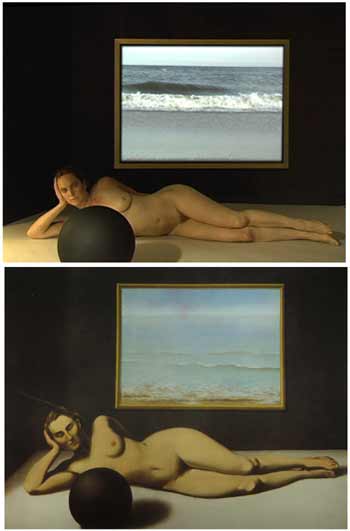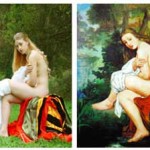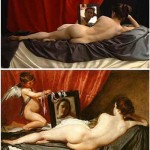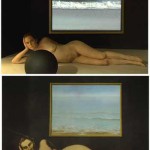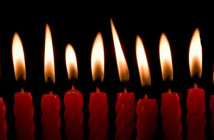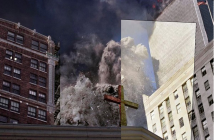Judi Rotenberg Gallery feels a bit eerie and subversive these days. The windows are blacked-out, labeled only with the title of the current show: "The Nudes". The gallery itself is as dark as a movie theatre, pulsing with the hum of video projectors. A strange sense of calm pervades the space, somewhere between the respectful peace of a major museum mixed with the solitary quiet of a 42nd Street peep-show.
Within this darkened, altered space, Mary Ellen Strom presents four video installation works that re-create classic paintings by Magritte, Manet, Velazquez and Gentileschi. Unlike the original paintings, though, these nudes move and blink and stretch. They look back at you, sometimes confront you, and generally act life-like in ways that paintings never will.
"All of the images are of women who are contemporary artists," gallery director Kristen Dodge said of the works. "(Strom) is re-examining the gaze, particularly the male gaze, and questioning where the power is at now. It's not necessarily important to know who these women are, only to know that they are women who have careers and are not just two-dimensional, objectified beings."
One of the most powerful tools of 'subversive' art has always been the ability to take back the gaze of the oppressor and reclaim it as one's own. bell hooks wrote of Madonna's overt posturing as a reclamation of her sexuality, and thus an extremely feminist act. (hooks later denied Madonna continued claim to feminist reclamation in a scathing review of the book Sex.) Spike Lee sparked much debate about the power of reclamation after presenting black actors wearing blackface in Bamboozled. Sophie Calle reclaimed her very persona from novelist Paul Auster in her book Double Game, while a long list of artists and activists have claimed back their identities from the traditional canon through the creation and adaptation of identities: Janine Antoni, Nikki S. Lee, William Pope.L, John Kelly...
It seems that there are an endless array of opportunities to re-claim one's identity from the traditions of art, culture, history, sexuality and gender. Anything traditionally white and male is fair game, held up as the power structure and the traditional oppressor, and therefore open to attack and re-definition. The white male writing these articles wants nothing more than to put that past behind us, to find a universality that does not allow for discrimation between gender or sexuality or age or race or shoe size, and I will always applaud works that push us toward those goals.
For me, "The Nudes" raises very interesting questions about the choice and nature of a social critique of an established institution. The canon of art history certainly reveres Manet, Magritte, Velazquez and Gentileschi, and these works are definitely viewed by scores of people every year. Yet, given the abundance of fodder in the popular media and recent history of our culture, is it worthwhile to re-claim femininity from paintings made by long-dead Masters in largely overthown social systems?
Strom's answer seems to be Yes, it is.
Her use of classic paintings as subject matter points to us the long and embedded history of the male gaze in art, and unending stream of images made throughout history that perpetrate male domination and control over women. The use of video makes them contemporary, brings them into our digital world, and forces us to consider the women as subjects and people, rather than paint on canvas. In some small sense, they become pornography, women to be ogled, and yet the very form of presentation denies ogling or pornographic reading. Instead, these awkard cycles of voyeurism and insight clarify the very problems Strom is looking at: classical nude paintings were very voyeuristic, created with a male gaze similar to modern pornography. The women in these paintings were desired only for their bodies, and translated into contemporary media they can claim back their humanity by denying objectification. The inclusion of contemporary artists as the subjects of theses images helps to further the cause of re-clamation, as it is not just women in general who are re-claiming the history, but women who currently work to promote and advance that very same history.
"The Nudes" at Judi Rotenberg Gallery is an opportunity to live in a world both old and new; to stand in the presence of great artworks and yet be challenged by their relevance and relationship to our contemporary world. These video images make us aware of an art history that is beyond our singular and traditional view, that makes viewers conscious of the limitations of our historical narrative, and yet does not discredit the histories upon which our contemporary dialogues are built.
- Mary Ellen Strom, Nude No. 4, Andrea Hendrickson, Video Projection, 2004. After
- Mary Ellen Strom, Nude No. 3, Dillon Paul, Video Projection, 2004. After
- Mary Ellen Strom, Nude No. 2, Hope Clark, Video Projection, 2004. After
Links:
Judi Rotenberg Gallery
"The Nudes" is on view April 22- May 7, 2005 at Judi Rotenberg Gallery.
All images are courtesy of the artist and Judi Rotenberg Gallery.

